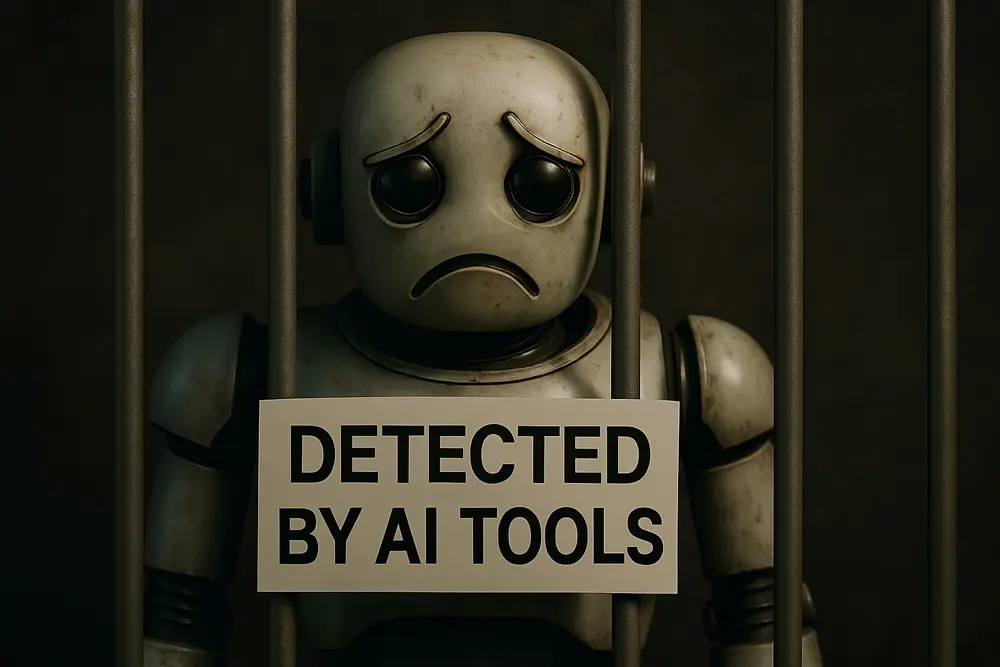A groundbreaking algorithm can now detect AI-generated music with perfect accuracy. Here's why songwriters and producers using AI tools need to think twice before hiding it...
by AiSongFix Staff | July, 29, 2025.

If you're using AI to help you make music and hoping no one will notice, it's time to rethink that plan. New technology has been developed for detecting AI-generated music.
It's a no-brainer to assume that music publishers, music licensing and talent agencies, as well as streaming platforms and distributors, will be using this technology to blacklist dishonest creators. After all, they have the deep pockets and the most to lose if they find themselves unknowingly dragged into a lawsuit because a creator didn't disclose the use of AI.
Musician and programmer Benn Jordan has developed a detection algorithm that can identify AI-generated music with 100% accuracy—and it's already stirring up conversations across the music industry.
In a recent exposé on his YouTube channel titled, "Using AI To Detect AI Music," Jordan explains how he analyzed over 560 AI-generated songs, primarily from platforms like Suno and Udio, and successfully flagged every one of them. His method? A clever use of compression artifacts—subtle audio fingerprints left behind when AI-generated music is trained on low-quality, compressed datasets scraped from platforms like YouTube and Spotify.
While most listeners can't hear these compression differences, Jordan's algorithm can—and that's what makes it powerful.
Jordan's work has significant implications for independent musicians, producers, and anyone experimenting with AI-generated compositions. Here's why:
Jordan found that the majority of AI songs he analyzed were already uploaded to Spotify under fake human aliases—some with hundreds of thousands of streams.
Jordan plans to approach platforms like TuneCore and DistroKid to advocate for policy changes that would prevent the monetization of undisclosed AI-generated music.
As this detection tech gains traction, music libraries, sync agents, and publishers may begin using it to vet submissions. If you're caught submitting AI music under false pretenses, it could damage your reputation—permanently.
AI music models are typically trained on heavily compressed audio scraped from the internet. This leaves telltale artifacts in the waveform—invisible to the ear but obvious to a trained algorithm.
Jordan's insight was simple but brilliant: what's missing in AI-created audio is just as telling as what's present. By analyzing the "missing data" caused by compression, he was able to isolate digital signatures unique to AI-generated music. These signatures form a kind of audio DNA, enabling detection even when the song sounds convincingly human.
The era of uploading AI-generated music and pretending it's human-made is rapidly coming to a close. AI song detection algorithm tools, such as Jordan's, are likely to become standard in artist and repertoire (A&R) departments of record labels, music publishing houses, music licensing and sync libraries, and digital service providers (DSPs).
The use of AI-detection technology is also likely to make its way into the U.S. Copyright Office, which has already issued a report on AI music copyright stating that only human creations are eligible for copyright.
All this means:
If you're using AI tools, transparency matters more than ever. Trying to pass off a fully AI-generated track as your own could get you dropped by your distributor, rejected by publishers, or blacklisted from licensing opportunities entirely.
➡️ Why Music Publishers Reject AI Songs (And How to Fix Yours)
Jordan isn't campaigning to ban AI in music—but he is advocating for disclosure. His position is clear:
Whether you're using AI to generate ideas, build drafts, or finalize tracks, be honest about your process. If you're collaborating with real musicians to humanize and refine your AI songs, you're likely on safe ground.
But if you're uploading raw AI content, changing the name, and hoping no one notices, your days may be numbered.
AI music detection is no longer a hypothetical concept. It's here. It works. And it could soon become an industry safeguard to protect honest creators and ensure royalties go to those who deserve them.
So if you're building with AI, build with integrity—because the industry is watching, and now it has tools that can see behind the curtain.
Need to humanize your AI song? We can help rewrite your lyrics, melody, or track to make it ready for copyright and pitching.
Country Demo Studio 🌐↗